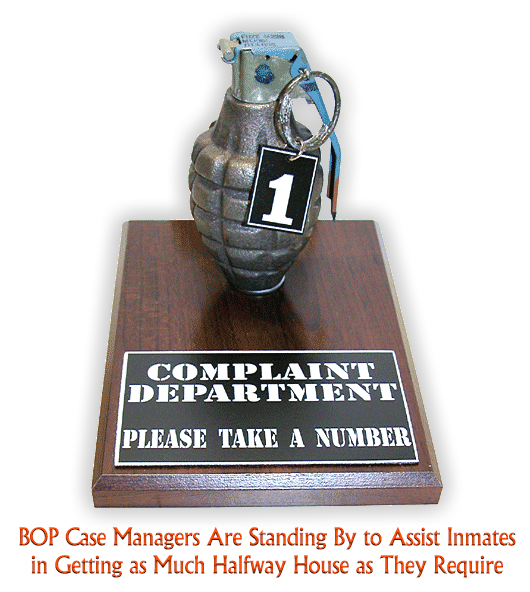We post news and comment on federal criminal justice issues, focused primarily on trial and post-conviction matters, legislative initiatives, and sentencing issues.

A TALE OF TWO BOPs
 At a House of Representatives Subcommittee on Crime, Terrorism and Homeland Security oversight hearing last Thursday on implementation of the First Step Act, it seemed at times that legislators were hearing about two different Bureaus of Prisons. One was staffed by dedicated professionals who were rapidly “developing guidance and policies to ensure appropriate implementation” of First Step. The other BOP was cutting halfway house, providing inadequate programs and “acting in ways that result in lengthier and less productive terms of incarceration despite the obvious will of Congress.”
At a House of Representatives Subcommittee on Crime, Terrorism and Homeland Security oversight hearing last Thursday on implementation of the First Step Act, it seemed at times that legislators were hearing about two different Bureaus of Prisons. One was staffed by dedicated professionals who were rapidly “developing guidance and policies to ensure appropriate implementation” of First Step. The other BOP was cutting halfway house, providing inadequate programs and “acting in ways that result in lengthier and less productive terms of incarceration despite the obvious will of Congress.”
Dr. Kathleen Hawk Sawyer, the veteran BOP hand brought back from retirement to take over the agency 12 weeks ago in the wake of the Jeffrey Epstein suicide fiasco, told the subcommittee that sentence reductions under the newly-retroactive Fair Sentencing Act has resulted in over 2,000 orders for release, with the release thus far of over 1,500 of those inmates. She told the Subcommittee that BOP “staff also immediately began the challenge of re-programming our Good Conduct Time (GCT) sentence computations to reflect the change. As a result, on July 19, 2019, when the GCT change took effect commensurate with the Attorney General’s release of the Risk and Needs Assessment System, the Bureau executed timely releases of over 3,000 inmates.”
This will come as surprising news to the thousands of people whose sentences have not yet had the revised GCT computations applied to their sentences.
She also reported that since First Step was signed into law, 95 inmates have received compassionate release (although she did not specify how many releasees were recommended by the BOP). She said the BOP has approved 328 inmates for the Elderly Offender Home Detention program, with 242 already on home detention and the balance awaiting placement.
 Sawyer Hawk urged the Subcommittee to fund and approve expanded UNICOR purchasing approval, authorizing more agencies, nonprofits and governments to buy UNICOR products. She said UNICOR employment has fallen from 20,000 several decades ago to 11,000 now, but that expansion of the pool of eligible buyers in the First Step Act assured that the number of UNICOR inmate employees would increase.
Sawyer Hawk urged the Subcommittee to fund and approve expanded UNICOR purchasing approval, authorizing more agencies, nonprofits and governments to buy UNICOR products. She said UNICOR employment has fallen from 20,000 several decades ago to 11,000 now, but that expansion of the pool of eligible buyers in the First Step Act assured that the number of UNICOR inmate employees would increase.
Sawyer Hawk implied that UNICOR, GED, literacy and drug programs would be among the programs for which earned-time credit was given once the PATTERN risk and needs assessment system was implemented. Apparently, the independent review committee that developed PATTERN also “selected programs to designate as evidence-based recidivism-reduction programs and productive activities,” according to Review Committee member John P. Walters, but neither he nor any other government witness identified what the programs would be.
Sawyer Hawk testified that training of BOP staff is underway for application of PATTERN as well as a yet-undefined system of assessing an inmate’s needs for programming. The suggestion is that BOP staff will select the programs that an inmate can take for earned-time credit according to the individual needs of the inmate for such programming. Sawyer-Hawk said, “The Bureau already has in place a robust Needs Assessment system, and we are working with experts in the field and research consultants to further enhance it.”
Walters tried to assuage concerns about PATTERN, telling the Subcommittee that the commission is working on “somewhat substantial” changes aimed in particular at removing possible bias in the tool. He said the contractors who developed the PATTERN system have run 200 additional hours of analysis at the independent review commission’s direction with the hopes of weeding out bias. “Obviously we want the instrument to be valid, but we also want the instrument to capture real differences and not bias,” Walters said.
A much less rosy picture was painted by New York City Federal Defender executive director David E. Patton and Professor Melissa Hamilton. Patton pointed out that current DOJ data show 49% of federal inmates complete no programs, 82% of such inmates receive no technical/vocational courses or UNICOR employment, and 57% of federal inmates needing drug treatment receive none. “Relatedly,” Patton said, “we are deeply troubled that there is still no needs assessment as required under the FSA, and that the BOP does not expect one to even be available for testing until the second quarter of 2020.”
Hamilton complained that PATTERN was being developed in an opaque process, one in which routine requests for release of the underlying data – something the U.S. Sentencing Commission does as a matter of course – and Freedom of Information Act requests have been ignored. The Brennan Center for Justice “requested release of information on the BRAVO/BRAVO-R tools that the DOJ Report indicates are foundations for PATTERN,” Hamilton testified, “yet were rebuffed because of proprietary claims. This initial assertion of secrecy is deeply concerning.”
 Patton also questioned the BOP’s commitment to halfway house placement. The BOP said in a 2017 memorandum that “due to fiscal constraints,” the average length of halfway house stay was “likely to decline to about 120-125 days.” However, Patton asserted, “anecdotal information from prisons indicates that counsellors have been told to limit the amount of prerelease time in reentry centers to even less than 120 days. At one prison, individuals reported seeing a printed sign on the counsellor’s wall reading: ‘We will put you in for a maximum of 90 days of RRC time, but it will most likely be less. Yes we know what the Second Chance Act says’.”
Patton also questioned the BOP’s commitment to halfway house placement. The BOP said in a 2017 memorandum that “due to fiscal constraints,” the average length of halfway house stay was “likely to decline to about 120-125 days.” However, Patton asserted, “anecdotal information from prisons indicates that counsellors have been told to limit the amount of prerelease time in reentry centers to even less than 120 days. At one prison, individuals reported seeing a printed sign on the counsellor’s wall reading: ‘We will put you in for a maximum of 90 days of RRC time, but it will most likely be less. Yes we know what the Second Chance Act says’.”
Rep. David Cicilline (D-Rhode Island), pointedly asked Sawyer-Hawk why people close to release whose dates were advanced by the additional 7 days-a-year good time were not having halfway house dates changed accordingly. Sawyer Hawk expressed surprise, saying that this was not happening throughout the system, and she would look into whether it was happening in New England.
Subcommittee’s questions focused primarily on the heating crisis at MDC Brooklyn, the Epstein suicide at MDC New York, BOP staffing levels nationwide and the PATTERN programming. One noteworthy moment came at the beginning of questions from Rep. Hakeem Jeffries (D-New York). He read a statement from the family of Troy Pine, the man Noel Francisco allegedly murdered in Providence, Rhode Island, several weeks ago. Francisco was released early because of the retroactive Fair Sentencing Act, creating a firestorm of criticism over the First Step Act.
Pine’s nephew urged people not to blame Trump or the First Step Act. “Anyone who speaks my uncle’s name, please speak it in a way that will draw people together, and bring help to people in these communities, including human beings who have been locked up for too long,” Jeffries read from the statement.
A Washington Times column on Saturday agreed: “The First Step Act is working. According to the FBI, the violent crime rate is at its second-lowest point since 1991. As previously stated, thousands of people have returned home as a result of First Step, more than 1,700 releases as a result of the crack cocaine/powdered cocaine disparity provision alone. And this case is the first reported incident of a First Step Act recipient re-committing a serious crime.
“But even one tragedy is one too many, and we still have much work to do. Our system is still broken, and we should focus on reforms that offer second chances, but more importantly, keep us safe.”
House of Representatives Committee on the Judiciary, Subcommittee on Crime, Terrorism, and Homeland Security, Oversight Hearing on the Federal Bureau of Prisons and Implementation of the First Step Act (Oct. 17)
Washington Times, First Step Act is working, but the criminal justice system is still broken (Oct. 19)
Providence Journal, Nephew of Providence murder victim: Don’t blame First Step Act (Oct 18)
– Thomas L. Root

